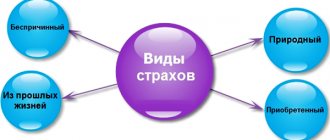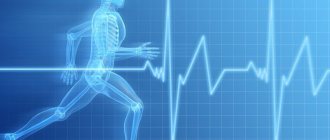Definition of VSD
The diagnosis of VSD is a purely domestic definition. In the European classification it is considered as generalized anxiety disorder. Neurasthenia occurs against the background of dysfunction of the harmonious functioning of the parasympathetic and sympathetic nervous systems. When both departments are functioning normally, they balance the body's reactions. In people suffering from neurosis, this process is disrupted.
Dystonia is formed as a result of dysfunction of the cerebral cortex and hypothalamus, which regulate the sympathetic and parasympathetic systems.
There are 3 main types of manifestation of neuroses.
- Cardiac - interruptions in the functioning of the heart muscle. Characterized by sensations of squeezing in the thoracic region, shortness of breath, and weakness.
- Hypertensive - surges in blood pressure provoked by stress or an uncomfortable psychological situation.
- Hypotonic - a decrease in blood pressure up to the point of fainting, also provoked by stress.
The effect of alcohol in neurosis
Ethanol alcohol is recognized as a universal tranquilizing agent. It is produced in small quantities in the human body and participates in the processes of protein synthesis. When a person consumes alcohol, the body does not regard it as a foreign substance.
Each individual's body has its own level of tolerance to ethanol. Consuming 100 g of beer is considered safe for the human body. Exceeding the dose leads to red blood cell clumping. A blood clot forms, clogging one of the nearby capillaries of suitable size. At this moment, endorphins are actively produced and sensitivity decreases. A vessel blocked by a microthrombus stops feeding the part of the brain that depends on it.
Further developments occur according to several schemes.
- The blood clot dissolves, the previously switched off part of the brain is connected, and the intoxication goes away.
- The capillary bursts under the pressure of the blood clot, blood flows into the brain area, and the neurons die.
- The blood clot remains in place, and the nutrition of the brain area is disrupted.
Dead neurons are replaced by connective tissue. Brain functionality decreases. In total, there are more than 100 billion neurons in the brain. Each dead nerve receptor reduces the strength of the central nervous system, and alcoholic neurosis appears.
If the stage of intoxication passes during sleep, the person wakes up from an exacerbation of the underlying disease. The heartbeat increases, the brain begins to function as in the wakeful stage.
As a result, panic attacks and phobic disorders of various types may appear.
Causes of alcoholic depression
The reasons that cause depression can be very diverse. For example, liver diseases, metabolic disorders, mental disorders. But the trigger in this case is one: alcohol.
It’s worth saying that you don’t have to drink buckets of alcohol. Moderate and regular consumption also causes alcoholic depression. In this case, the pathological process begins to proceed at an accelerated pace if there are provoking factors: stress, conflicts and other troubles. At the same time, the initial reaction does not correspond to the situation: emotions are absent where they should be.
Symptoms of alcoholic neurosis
Symptoms of alcoholic neurosis:
- Formation of stable dependence.
- Increased sweating, chills.
- Irritability.
- Headaches.
- Sleep disorders.
- Temperature increase.
Systematic consumption of alcohol leads to persistent addiction. The brain stops sending signals to the endocrine system, which controls the production of happiness hormones, without ethanol. Toxins gradually replace neurotransmitters that transmit impulses to the brain. Internal organs suffer. The blood vessels weaken, sweating and chills appear.
After drinking alcohol, constant dissatisfaction appears. Irritability becomes a predominant character trait and does not disappear over time even under the influence of intoxicating drinks. Constant stress leads to long-term depression, which the patient tries to overcome.
Headaches are a constant symptom that accompanies alcoholism.
Oxygen starvation of the brain occurs due to the destruction and blockage of blood vessels that provide blood flow. Imaginary relief comes after a dose of alcohol. Each time the body requires an increasingly larger batch of the drink. Even large volumes of drinking cease to bring pleasure, and the brain gradually stops working, which leads to complete degradation. A person is not aware of himself, loses memory, keeps track of days.
Acute alcohol intoxication.
Alcohol has a paralytic effect on the nervous system; The higher brain functions are the first to suffer. Therefore, early signs of intoxication are behavioral changes.
The social significance of drinking moderate doses of alcohol is determined by its ability to remove the inhibitions that shape human behavior and suppress the critical ability of the drinker.
In large doses, alcohol causes behavioral abnormalities, the nature of which depends on the individual's temperament: he can become agitated, talkative, belligerent, depressed or tearful when drunk. There are memory impairments, especially for recent events. The ability to perform complex coordination movements is progressively impaired. Articulation may be impaired, conjunctival hyperemia is characteristic, the pupils are usually dilated, but may be narrowed, the reaction of the pupils to light may change; Nystagmus is characteristic, and diplopia sometimes occurs. In very large doses, alcohol causes stupor, then coma and finally death due to paralysis of the vital centers.
The relationship between blood alcohol content and the state of the nervous system is ambiguous. Body weight, pre-meal, which slows down the absorption of alcohol, and the habit of drinking alcohol are of great importance. There are also significant individual differences in the rate of alcohol metabolism associated with the concentration of alcohol dehydrogenase in the liver. Approximate clinical signs of acute alcohol poisoning (see table).
Therapy for mental disorders
Symptoms of alcoholic neurosis require treatment. The sooner psychocorrection begins, the greater the chance of returning patients to normal life. No method of influence will be effective until the patient decides to give up alcohol. It is important to find the reason why a person is trying to forget.
The first stage of treatment is to give up alcohol. It is necessary to remove toxins from the body. The procedure takes 21 days. During this time, it is important that the person motivates himself correctly and does not lose his temper. For this purpose, psychocorrection is carried out in a special institution.
Neurolinguistic programming gives good results. This approach allows you to quickly determine the causes of binge drinking and model behavioral reactions.
Neurosis and alcohol together destroy the nervous system more severely, so some symptoms can be relieved with medications.
Patients who treat VSD with alcohol realize that their behavior is wrong, but cannot refuse it. In such cases, drugs that cause aversion to alcohol, antidepressants or sedatives are prescribed. Nootropics are used in the treatment of alcohol addiction and neurasthenia. This group of drugs helps restore neurotransmitter communication.
Treatment of alcoholism must be comprehensive
The patient is given IV drips to remove alcohol from the blood. Violent patients are shown tranquilizers to relieve alcohol withdrawal.
When can you drink if you have neurosis?
Whether you can drink alcohol with neurosis depends on several factors:
- Ethanol dosage.
- A type of neurological disorder.
- Alcohol tolerance.
Ethanol is best tolerated by patients with hypotensive disorders. Alcohol has a vasodilating effect, which improves the well-being of patients with low blood pressure. For non-drinkers, alcohol and neurosis are comparable: you can drink up to 50 g of vodka or red wine at night. For patients with alcohol intolerance, it is better to completely avoid even alcohol-based medicinal tinctures.
What rules should you follow when drinking alcohol?
Nowadays it is almost impossible to avoid drinking strong drinks, and it is not necessary, because any family celebration, especially a wedding, cannot happen without alcohol, as well as corporate parties with colleagues and picnics.
It is worth paying attention to the behavior of people who take part in common feasts, but do not experience a severe hangover the next day, and such people always exist, and behave in approximately the same way, even a little more carefully, and everything will be fine. No one will blame a person for straying from the team, and he himself will be pleased that he managed to avoid the nightmare of a hangover; he will like the feeling of a winner, and he will try to continue this.
neuroz.club
Consequences of nervousness aggravated by alcoholism
The consequences of psychoneurosis from alcohol are terrifying. Hallucinations and persistent addictive behavior appear. A person gets irritated over trifles, because the part of the brain responsible for pleasure does not function without a dose of alcohol.
The most common symptom of drinking alcohol is a hangover. The patient feels guilty for his actions. Symptoms disappear after complete cleansing of the body. The danger to the body is alcoholic neurasthenia and psychosis, which differ in clinical picture. Patients behave violently or become depressed.
Addictive behavior in combination with neurasthenia leads to the destruction of social ties, job loss, communication problems, divorce, etc. Neurasthenia from alcohol is represented by 2 types.
- Hysteria.
- Obsessive-compulsive neurosis.
Hysteria
When drinking alcohol has grown into a persistent habit, hysterical neurasthenia occurs especially often. The patient does not adequately assess what is happening. He develops a prejudiced attitude towards himself. He regards all attempts to help as a threat.
When drinking alcohol, a violent reaction occurs. The impetus for hysteria is a conflict situation that occurred in the present or past. The patient becomes inadequate: he hits the walls with his head, tears his clothes and hair. The face becomes purple-red or completely pale, the lips turn blue. Spasms often appear in the thoracic region. Fainting and convulsions are possible.
A less vivid symptomatic picture is observed. The patient's behavior seems feigned; he is trying to attract the attention of others. A person does not find a place for himself, sits down, gets up, lies down. May laugh for a long time without stopping for no reason or cry bitterly.
Hysterical neurosis is associated with disturbances in the functioning of the sense organs. Patients with this type of neurasthenia are characterized by egocentrism. He tries to always be surrounded by people when seizures occur.
Obsessive-compulsive disorder
Pathology appears when interpersonal conflict occurs. Anxiety disorder is accompanied by the emergence of obsessions that force the individual to perform special rituals to calm the conscience. Thoughts arise involuntarily and cannot be controlled. They always have a negative psycho-emotional connotation. The patient is expecting bad events.
If a VSD crisis occurs due to alcohol consumption, patients regard it as a sign of imminent death. People with compulsive disorder expect the attack to recur. The brain is already tuned to death, so it is desperately preparing for it. Against this background, suicidal tendencies may appear.
Obsession can be paranoid in nature. A person under the influence of ethanol convinces himself that he has become a victim of betrayal by friends, his other half. All this is accompanied by reproaches, hysteria and even assault.
It is not possible to cure obsession without the help of a psychiatrist. The main role in treatment is played by complete abstinence from drinking alcohol.
How can you explain the anxiety and panic from a hangover?
Endocrinologists tried to explain the poor emotional state after drinking alcohol by the fact that alcohol causes vitamin B12, which is responsible for mood, to be washed out of the body, and until the amount of this vitamin is restored, a person feels anxiety and uncertainty.
Among other things, the body, trying to get rid of harmful substances, loads the excretory organs (kidneys, lungs, skin), circulatory system, liver beyond normal, while the whole body experiences stress from emergency work, weakness, moral devastation occurs, and anxiety is added to the treasury New Arrivals.
Many people think that “it’s hard, but not fatal,” but no, it can be very dangerous. Anyone who is familiar with the statistics of deaths in such cases will confirm this truth, and how many people who drink remain half-dead in the literal sense, because strokes are not uncommon when there are surges in blood pressure; in such cases, the patient is not always seen off with a compassionate look and the thought “I’ve finished drinking.”
What for one, due to individual characteristics, is imperceptible, for another the next day causes a whole range of disgusting sensations, both physical and emotional, especially for reflective individuals. We are interested in the emotional state of a person, the feeling of anxiety after alcohol.
The work of the nervous system is based on the finest chemical and bioelectric processes, and thanks to human actions, gross poison penetrates there, after all this it is difficult to have a good state of mind and positive emotions, this does not happen. In most cases, someone who has drunk badly or does not remember at all how he behaved the day before, he assumes the worst, especially when there are actual traces of his destructive actions or he learns about insults or ridicule expressed by him towards people close to him, relatives or colleagues.
A panic attack puts him in a depressed state, his sense of guilt is exaggerated to the limit, a severe emotional state worsens his already disgusting physical condition, which, in turn, frightens the person even more. Moreover, sometimes there are “well-wishers” who tell things that never happened. In this state, people with a weak psyche may experience suicidal thoughts. At this time, it is necessary to show friendly attention to the person, to protect him from ridicule and jokes.











